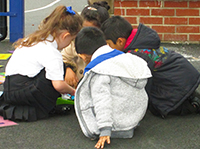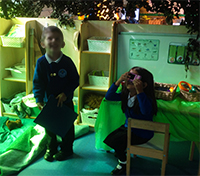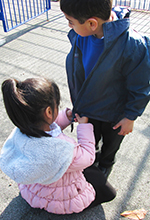School Supply Service
Debbie Davis, Early Years Specialist
Debbie is able to travel to schools in the Huddersfield, Wakefield and Barnsley areas at short notice.
The curious child
 The ideal early years settings develop each child’s ability and desire to learn independently. This independence manifests as freedom, play and choice, forming the strongest foundations for academic learning.
The ideal early years settings develop each child’s ability and desire to learn independently. This independence manifests as freedom, play and choice, forming the strongest foundations for academic learning.
The curious child has a vivid imagination, is articulate enough to explain their ideas and has the social confidence to share these and their play with others.
While independent decision makes and able to persevere when they begin to exceed their natural abilities, they can find extra reserves through collaborative play and asking forward-looking questions. In the real world, however, these children are, unfortunately, in the minority.
Early years settings, then, must continually, incrementally develop these skills and attitudes during every element of every day. In practice, the key to these transformations is our ability to understand what makes each individual child ‘come alive’ – the magic of moments, of awe and wonder.
 There’s no mystery surrounding the sparks that create a love of learning, simply thoughtful planning. A role-play area that allows children to dislocate themselves from reality and explore their shared imagination; an outdoor area where play can range from thoughtful introspection around nature to the exuberant conquest of a narrative journey; painting, construction, modelling and woodworking where children learn to create artefacts that are rewarded with kudos from all around them.
There’s no mystery surrounding the sparks that create a love of learning, simply thoughtful planning. A role-play area that allows children to dislocate themselves from reality and explore their shared imagination; an outdoor area where play can range from thoughtful introspection around nature to the exuberant conquest of a narrative journey; painting, construction, modelling and woodworking where children learn to create artefacts that are rewarded with kudos from all around them.
And from within the diversity of every cohort, comes an exploration and celebration of difference. Our art form as teachers is to expose children to a variety of stimuli that ensures every flame is alight, and that every flame inspires a journey forward in whatever direction the child chooses. An environment that can achieve this must evolve to match each child’s choices. We must continually guard against ‘learned dependency’, while understanding and mitigating any challenges this may and will bring. While children may well be dependent on arrival in reception, with the right expectations from us, we can soon transition from, say, setting up art and messy play areas for them, to the children setting up these areas themselves. And, of course, this must also include the tidying and cleaning – the development of consequential through – that goes along with their choices.
celebration of difference. Our art form as teachers is to expose children to a variety of stimuli that ensures every flame is alight, and that every flame inspires a journey forward in whatever direction the child chooses. An environment that can achieve this must evolve to match each child’s choices. We must continually guard against ‘learned dependency’, while understanding and mitigating any challenges this may and will bring. While children may well be dependent on arrival in reception, with the right expectations from us, we can soon transition from, say, setting up art and messy play areas for them, to the children setting up these areas themselves. And, of course, this must also include the tidying and cleaning – the development of consequential through – that goes along with their choices.
Freedom to play, explore and make independent choices creates the best, accurate baseline assessment that cultivates the skills and attitudes of a happy, able child.
Debbie Davis



